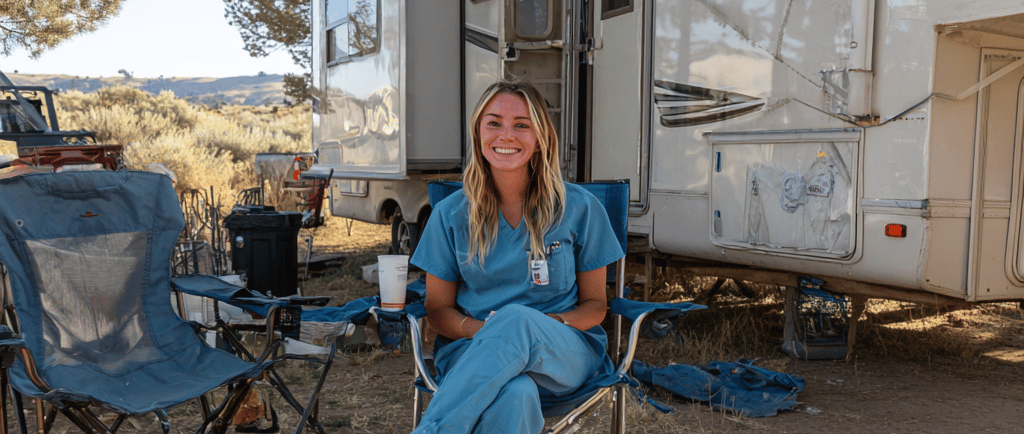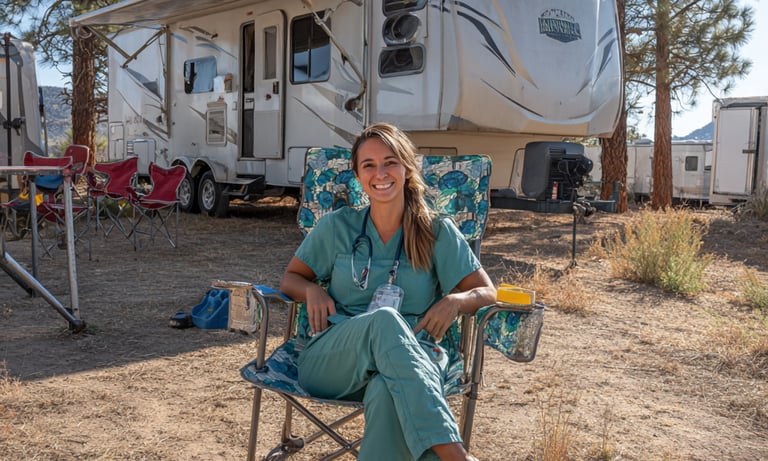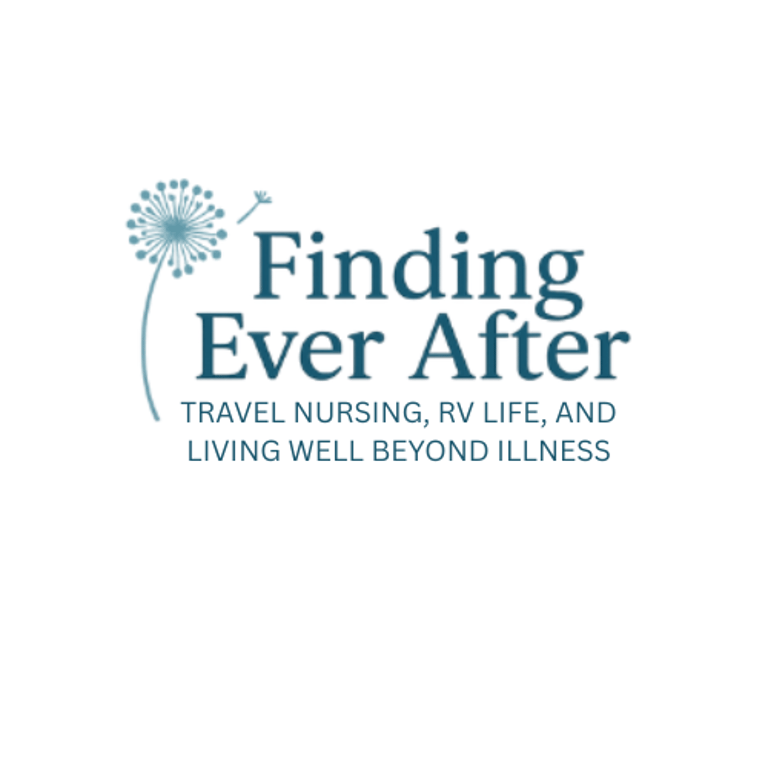How to Get Started as a Travel Nurse: A Step-by-Step Guide
Thinking about becoming a travel nurse? This step-by-step guide from a seasoned nurse covers recruiters, contracts, packing essentials, housing options (including RV life), taxes, facility expectations, and tips for thriving on assignment.
TRAVEL NURSING & CAREER
Velvet Larrabee
9/7/20257 min read


Stepping into the world of travel nursing can feel like opening a brand-new chapter—exciting, intimidating, and filled with possibilities all at once. I still remember my first assignment: the nervous excitement of signing my contract, the endless questions about what to pack, and the awkwardness of walking into a new facility where everyone already knew each other. Fast forward a few years, and I can honestly say travel nursing has been one of the most rewarding decisions of my career.
If you’re thinking about making the leap, this guide is for you. I’m going to walk you through the steps I wish someone had sat down and explained to me in the beginning—from choosing the right recruiter to tax considerations, RV life on the road, and even how to handle unwelcoming coworkers. Think of this as advice from a nurse friend who’s been in your shoes, not a lecture from a textbook.
Step 1: Understand What Travel Nursing Really Is
Write your text here...At its heart, travel nursing is about filling gaps in healthcare. Facilities bring in travelers when they’re short-staffed, opening a new unit, or dealing with seasonal surges. That means you’ll usually be stepping into a situation where staff are stretched thin—and your flexibility, professionalism, and calm under pressure will make you a hero.
But travel nursing isn’t just about work—it’s a lifestyle. It’s about being okay with change, enjoying new environments, and learning to adapt quickly. You’ll grow not only as a nurse but also as a person, because you’ll constantly be stretching outside your comfort zone.
Step 2: Choosing the Right Recruiter
Your recruiter is your lifeline. A good recruiter can make your experience smooth, while a poor one can turn it into a nightmare. Here’s what to look for:
Communication: Do they respond promptly and answer your questions clearly?
Transparency: Do they explain pay packages, stipends, and contract details without dancing around numbers?
Support: Will they have your back if something goes wrong at the facility?
Chemistry: Do you feel like they listen to you, or just push assignments they need to fill?
Pro tip: Talk to several recruiters before committing. You don’t have to marry the first one you meet. Think of it like dating—you’re looking for someone who respects your needs and values your goals.
Step 3: Understand the Contract Before You Sign
Contracts can be full of fine print, and once you sign, you’re locked in. Here’s what you absolutely need to review:
Pay breakdown: Hourly rate, stipends, overtime, and on-call policies.
Guaranteed hours: Some facilities cancel travelers often—make sure you’re still paid for guaranteed shifts.
Cancellation clauses: What happens if the facility ends your contract early? Or if you need to back out?
Floating expectations: Will you float between units, and if so, are you comfortable with those areas?
Shift and holiday requirements: Don’t assume—you need this in writing.
Never feel bad for asking questions. A contract is a legal document, and protecting yourself is part of being a professional.




Step 4: Leaving Your Staff Job Gracefully
If you’re coming from a permanent position, leaving on good terms matters. Healthcare is a small world—you never know when you’ll cross paths with old coworkers or need a reference.
Give proper notice (usually two to four weeks).
Be honest, but professional: explain you’re pursuing travel opportunities, not running away.
Offer to help train your replacement or leave notes to make the transition smoother.
Leaving with grace shows respect for your colleagues and keeps doors open.


Step 5: Choosing the Right Contracts for Your Experience
Not every contract is a good fit, especially when you’re new. Here are some options to consider:
Starter assignments: Facilities with strong orientation programs or high traveler volumes are easier to transition into.
Level of acuity: Don’t jump into the toughest trauma hospital in the country if you’re not ready—it’s okay to build confidence.
Geographic considerations: Pick a location that excites you but also makes sense logistically for your first run.
Length: Standard contracts are 13 weeks, but shorter assignments exist. Beginners often do better with the standard length.
Remember: it’s okay to start “easy” while you’re learning the ropes.


Step 6: What to Pack and Take With You
Write your text here...Packing for travel nursing depends on your living situation. Since I live in my RV, I bring my home with me—but even then, I’ve learned to streamline.
Essentials:
All licenses, certifications, and copies of health records.
Scrubs, comfortable shoes, stethoscope, badge clips.
Portable printer/scanner for contracts and timesheets.
A “go bag” with 3 days of clothes and essentials in case travel hiccups happen.
RV Life Pro Tip: Bring basic tools, spare parts, and a good surge protector. Your home is also your job stability—you want it running smoothly.
Step 7: Tax Considerations for Travel Nurses
Taxes for travel nurses can be tricky. Many of us qualify for tax-free stipends (housing, meals, incidentals), but you need to maintain a “tax home” to do so.
Tax home: Usually your permanent residence where you have ties (mortgage, bills, etc.).
Documentation: Keep records of mileage, contracts, and expenses.
Professional help: A tax accountant who understands travel healthcare is worth their weight in gold.
Mishandling taxes can cost you thousands, so don’t wing this part.
Step 8: Living Accommodations—RV, Housing, or Stipends
Write your text here...One of the best parts of travel nursing is choosing how you live.
Agency housing: Convenient but less flexible.
Housing stipend: More freedom—you find your own place and keep the extra if you spend less.
RV life: My favorite. It gives consistency, comfort, and community (yes, RV parks often feel like little villages).
Whichever you choose, factor in commute, safety, and amenities.


Step 9: Facility Expectations—Know Before You Go
Every hospital is different. Before signing, ask:
How long is orientation?
Will you float, and to which units?
What’s the nurse-to-patient ratio?
Is there mandatory call or overtime?
Walking in blind is the fastest way to burn out. Clear expectations set you up for success.
Step 10: Professionalism While on Assignment
As a traveler, eyes are on you. Some staff will welcome you warmly, others might resent you. Either way, professionalism is non-negotiable.
Be punctual, dependable, and flexible.
Avoid workplace gossip—stay neutral.
Respect facility policies, even if they differ from what you’re used to.
Go above and beyond, but don’t let yourself be exploited.
You’re there to help, not to prove yourself endlessly. Balance is key.
Step 11: Handling Unwelcoming Staff


This is a tough one. Sometimes you’ll walk into a unit where staff resent travelers for “making more money.” Here’s how I handle it:
Empathy first: Remember, they’re overworked too.
Kindness: A smile and small kindnesses go further than you think.
Professional boundaries: Don’t engage in conflict—focus on patient care.
Find allies: Even one supportive coworker can make all the difference.
At the end of the day, you’re there temporarily. Don’t let negativity steal your peace.
Step 12: Building a Support System on the Road
Travel nursing can feel lonely if you don’t make connections.
Join travel nurse groups online or at your RV park.
Explore your new town—find a coffee shop, yoga class, or hiking group.
Stay connected to family and friends through regular calls or visits.
A healthy support system makes the lifestyle sustainable.
Step 13: Keep Growing Professionally
Use your assignments to grow. You’ll be exposed to new charting systems, patient populations, and hospital cultures. Keep a running list of your new skills—it makes you a stronger candidate for future jobs.
Step 14: Remember Why You Started
Write your text here...Travel nursing isn’t just about higher pay (though that’s nice). It’s about freedom, adventure, and creating a career on your terms. When the road gets hard—and it will sometimes—remember your “why.” For me, it’s the freedom to live in my RV, explore new places, and still do the work I love.
Final Thoughts
Becoming a travel nurse is one of the bravest steps you can take in your nursing career. It’s not always easy, but it’s incredibly rewarding. If you go into it prepared—choosing the right recruiter, reading your contracts carefully, packing smart, and staying professional—you’ll set yourself up for success.
And remember: you don’t have to have it all figured out before you start. Most of us learned by doing. Take the leap, trust yourself, and know that the road ahead can be one of the most meaningful journeys of your life.
👉 Your Turn: Thinking of becoming a travel nurse? What’s the biggest question or worry on your mind? Drop it in the comments—I’d love to share what I’ve learned and help you start your journey.
Some travel nurses choose RV life for housing. Here’s my full guide on whether RV living makes sense for you.
✨Nursing with lupus comes with unique challenges. Here's how I personally manage lupus while working as a nurse.
